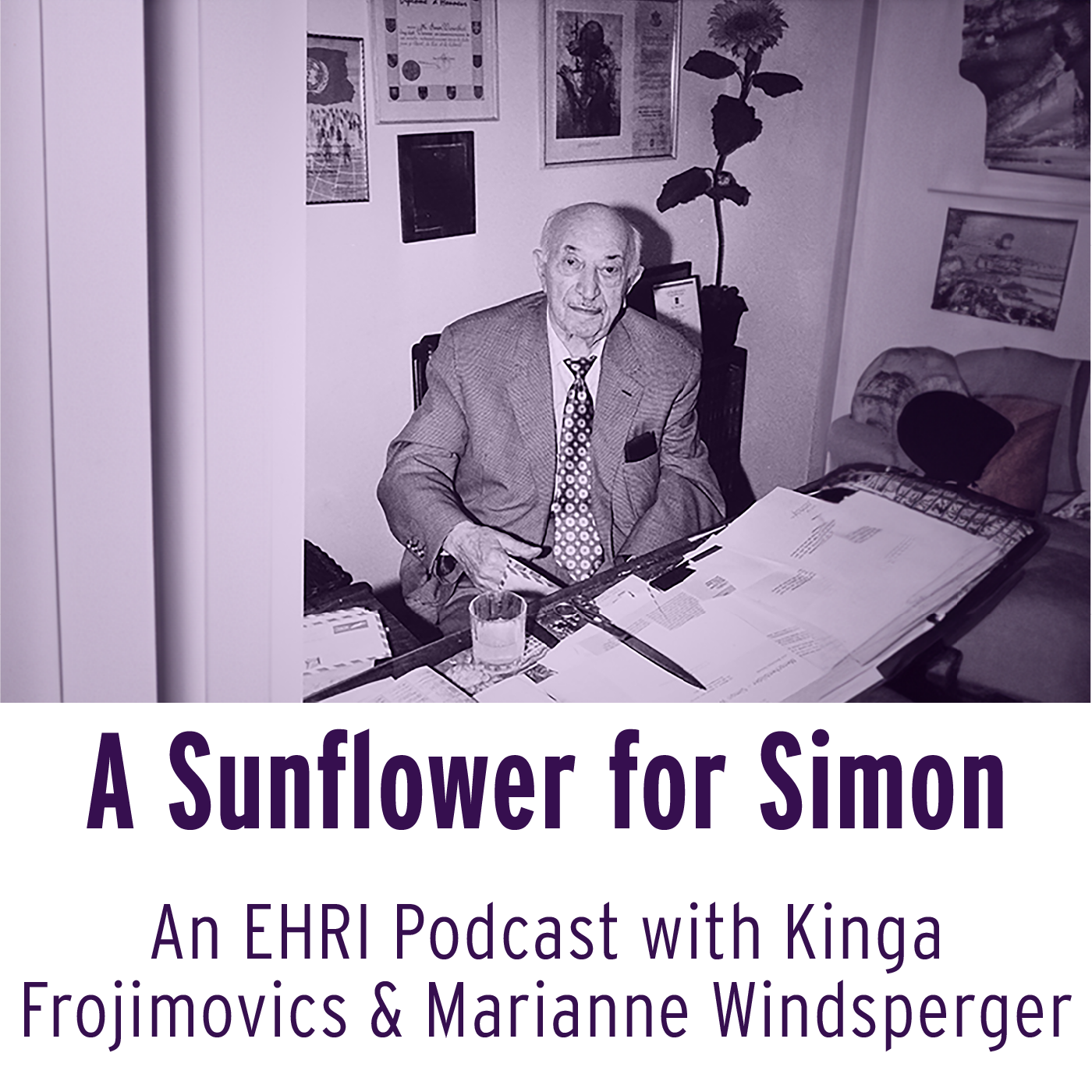
Release date: 5 October 2023 | More about the Podcast Series For the Living and the Dead. Traces of the Holocaust
In this episode, we talk about Simon Wiesenthal’s sunflowers, real ones, or artificial and made from paper or any other material. In 1969, well-known Holocaust survivor and author Simon Wiesenthal wrote The Sunflower. On the Possibilities and Limits of Forgiveness. In this book, he recounted his experience with a mortally wounded Nazi soldier during World War II, and then asked prominent figures from politics, science and theology the question about what they would do under the circumstance.
The “Sunflower” in the title referred to Wiesenthal's observation of a German military cemetery, where he saw a sunflower on each grave, while he was imprisoned in the Janowska concentration camp near Lviv and feared for his own body to end up in an unmarked mass grave.
The book touched many people, some of whom then expressed their emotions by sending sunflowers, real or crafted, to Wiesenthal’s office.
The sunflowers are now part of the collection of the Vienna Wiesenthal Institute for Holocaust Studies (VWI) in Austria.
Featured guests:
Marianne Windsperger works as a research coordinator at the Vienna Wiesenthal Institute for Holocaust Studies (VWI). Kinga Frojimovics is a historian and senior archivist and project leader at the VWI. Podcast host is Katharina Freise.
Marianne and Kinga will tell the story of Simon Wiesenthal, his book and the sunflowers. Listen to the episode on Buzzsprout, Spotify, Apple Podcasts, Google Podcasts or here:
I called the book Sunflower. Because on every military cemetery in the Eastern countries and every German military cemetery and the place of a cross, they give a sunflower and I remember when we walked to this place, for me was the sunflower, like a periscope, to bring light into the darkness of the grave, and I know, we expect a mass grave… but all this, in the time when he was talking, I saw the sunflower, I think, he is a murderer he will have the sunflower, and I… I will have nothing.
Simon Wiesenthal in a radio interview for Chicago based WFMT radio, March 12, 1976
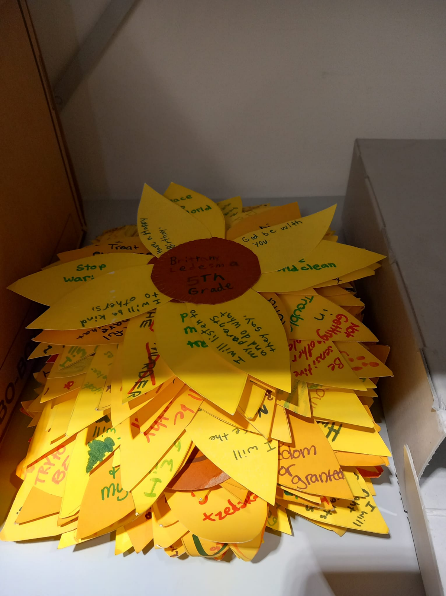 In 1976, Simon Wiesenthal gave a radio interview in the US in which he talked about, among other things, his book The Sunflower: On the Possibilities and Limits of Forgiveness. Simon Wiesenthal originally wrote "The Sunflower" in German, however, he also worked on parallel language editions of the book. In 1969, the French edition was published, followed by the German and English editions. Simon Wiesenthal had by then become a well-known Holocaust survivor, writer and “nazi-hunter” (a not uncontroversial title). The book inspired many readers to send all kinds of sunflowers to the author. These objects have been saved and are now stored in the archive of the Vienna Wiesenthal Institute in Austria as part of their Wiesenthal collection.
In 1976, Simon Wiesenthal gave a radio interview in the US in which he talked about, among other things, his book The Sunflower: On the Possibilities and Limits of Forgiveness. Simon Wiesenthal originally wrote "The Sunflower" in German, however, he also worked on parallel language editions of the book. In 1969, the French edition was published, followed by the German and English editions. Simon Wiesenthal had by then become a well-known Holocaust survivor, writer and “nazi-hunter” (a not uncontroversial title). The book inspired many readers to send all kinds of sunflowers to the author. These objects have been saved and are now stored in the archive of the Vienna Wiesenthal Institute in Austria as part of their Wiesenthal collection.
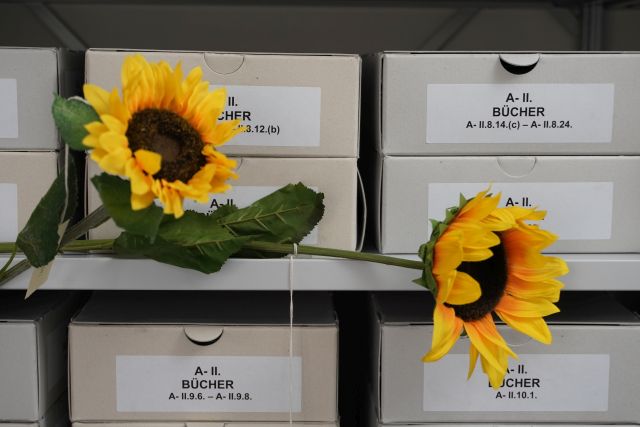 To some the sunflower has become a symbol for the Holocaust. The sunflower that is planted on a grave is a symbol of remembrance for the person buried and an act of bearing witness to a single life. Wiesenthal’s book, The Sunflower, is also a gesture of bearing witness to the many people who died nameless in mass graves.
To some the sunflower has become a symbol for the Holocaust. The sunflower that is planted on a grave is a symbol of remembrance for the person buried and an act of bearing witness to a single life. Wiesenthal’s book, The Sunflower, is also a gesture of bearing witness to the many people who died nameless in mass graves.
Simon Wiesenthal
Simon Wiesenthal was born in 1908 in Buchach, which was then part of Austria-Hungary and now of Ukraine. He had studied architecture and was in Lviv with his wife Cyla when the war broke out. As Jews, they were forced to live in the ghetto and then to Janowska concentration camp. Wiesenthal and his wife both managed to survive the Holocaust under horrible circumstances. Immediately after the war, Wiesenthal started to collect information on both victims and perpetrators of the Holocaust. He worked for the War Crimes Section of the United States Army, and in 1947 he opened the Jewish Historical Documentation Center in Austria. He said:
“When history looks back I want people to know the Nazis weren't able to kill millions of people and get away with it.”
For decades, Wiesenthal pressured Western governments to locate and prosecute escaped Nazi offenders and also offered leads that sometimes led to their extradition.
He also published several books, articles and memoirs, among which The Murderers Among Us: The Simon Wiesenthal Memoirs (1967) and The Sunflower (1969). Wiesenthal's tenacity and unflagging passion for tracking down perpetrators inspired survivors of the Holocaust and other genocides to believe that justice can and will prevail, even with the passage of time. He died in September 2005 in Vienna, aged 96.
The Sunflower. On the Possibilities and Limits of Forgiveness
In the first half of the book The Sunflower, Wiesenthal recounts a tragic event that happened to him while in the concentration camp near Lviv. In 1943, a group of forced labourers, including Wiesenthal, are sent to a converted army hospital to clear medical waste. Simon Wiesenthal is summoned from this work by a nurse to the bedside of a dying Nazi soldier. The soldier tells him he is seeking "a Jew's" forgiveness for a crime that he has committed one year prior. Over a number of hours, the soldier tells Wiesenthal his life story and then confesses to having participated in the destruction, by fire and armaments, of a house with three hundred Jews inside. He states that as the Jews tried to leap out of windows to escape the burning building, he and the other soldiers gunned them down.
After the soldier finishes this story, he asks Wiesenthal to forgive him. Wiesenthal then leaves the room without saying anything. The next day, the nurse informs Wiesenthal that the soldier has died.
In the second half of the book, Wiesenthal poses the ethical dilemma of whether or not he should have forgiven the nazi-soldier to the reader, and then to a group of well-known people, as diverse as the Dalai Lama, Deborah Lipstadt, Desmond Tutu and Albert Speer, who give their responses in the various language editions.
The Vienna Wiesenthal Institute for Holocaust Studies (VWI)
During the last years of his life, Simon Wiesenthal was particularly eager to make his personal archive, which had grown out of his many years of work, accessible to research. He wanted the documents to form the basis for further research with new questions in the context of an academic institute, and thereby wanted the spirit of his work to be preserved in a time when both the perpetrators and the victims of the Nazi era will have died.
In the year 2000, when Simon Wiesenthal was still alive, several renowned Viennese academic institutions and the Jewish Community of Vienna (IKG) initiated the establishment of an international centre for research into the Holocaust. Simon Wiesenthal still had the opportunity to personally contribute to the design of the resulting “Vienna Wiesenthal Institute for Holocaust Studies” before his death in September 2005. The institute was intended, in accordance with the spirit of his life’s work, to be dedicated to research, documentation, and education on all issues relating to antisemitism, racism, nationalism, and the Holocaust, while remaining above all open to new and innovative developments in relevant areas of research. It was finally decided in 2008 that the Republic of Austria and the City of Vienna would finance the three-year foundation phase of the institute on the basis of a detailed plan of working stages together with the Jewish Community (IKG) and the supporting organisation of the Simon Wiesenthal archive, the Association of Jewish Victims of the Nazi Regime.
The Vienna Wiesenthal Institute for Holocaust Studies (VWI) is active in three central fields. Its documentation activity centres on its collections, the Holocaust-related parts of the IKG archive, which are on loan to the institute, and the estate of Simon Wiesenthal with its extensive holdings on Nazi perpetrators, as well as the VWI library. On the basis of these collections, which are either owned by or accessible at the institute, the VWI conducts its research activities in the form of projects and the initiation of publications.
Two other important pillars for the intstitute are the fellowship programme and education.
VWI has been a partner of EHRI since 2015.
Marianne Windsperger and Kinga Frojimovics
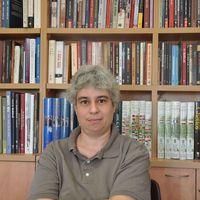 Dr. Kinga Frojimovics is a historian and archivist, and project leader at the VWI since February 2020. Frojimovics studied history, archival studies, and archaeology at ELTE University in Hungary, and Jewish history at Bar-Ilan University in Israel. She is the former director of the Hungarian Jewish Archives (Budapest, 1993-1997), and was head of the Hungarian Section of the Yad Vashem Archives (Jerusalem, 2006-2018). From 2010 she is member of the Commission for the Designation of the Righteous among the Nations of Yad Vashem (Jerusalem, Israel), and from 2011 Member of the Academic Advisory Committee of Hadassah-Brandeis Institute, Brandeis University (Waltham, MA, USA). Her research fields are the history of the Holocaust in Hungary, Jewish religious life in Hungary, and cataloguing of Jewish and Holocaust-related archival collections. She has authored six monographs, edited four volumes, and published numerous articles in peer-reviewed journals.
Dr. Kinga Frojimovics is a historian and archivist, and project leader at the VWI since February 2020. Frojimovics studied history, archival studies, and archaeology at ELTE University in Hungary, and Jewish history at Bar-Ilan University in Israel. She is the former director of the Hungarian Jewish Archives (Budapest, 1993-1997), and was head of the Hungarian Section of the Yad Vashem Archives (Jerusalem, 2006-2018). From 2010 she is member of the Commission for the Designation of the Righteous among the Nations of Yad Vashem (Jerusalem, Israel), and from 2011 Member of the Academic Advisory Committee of Hadassah-Brandeis Institute, Brandeis University (Waltham, MA, USA). Her research fields are the history of the Holocaust in Hungary, Jewish religious life in Hungary, and cataloguing of Jewish and Holocaust-related archival collections. She has authored six monographs, edited four volumes, and published numerous articles in peer-reviewed journals.
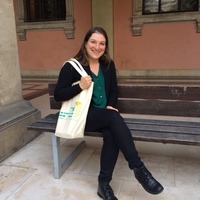 Mag.a phil. Marianne Windsperger is a literary scholar with a focus on literary representations of the Holocaust, autobiographical sources, Yiddish literature, and theories of memory. Marianne Windsperger received her MA in Comparative Literature and Romance Studies from the University of Vienna and is a graduate of the Uriel Weinreich Program for Eastern European Jewish History and Culture at the YIVO Institute in New York. She has been working as a research assistant at the VWI since 2018. Here, she coordinates the establishment of the Austrian consortium within the framework of EHRI-AT. In addition, she is an editorial team member of the open-access journal S:I.M.O.N. and a collaborator for the fellowship program as well as for scientific publications. She also develops and organizes scientific events. Previously, she has been university assistant and project assistant at the Institute for German Studies at the University of Vienna (2014-2017) and research assistant at the Theodor Kramer Society (2017-2018). Since 2018, she serves as a board member there.
Mag.a phil. Marianne Windsperger is a literary scholar with a focus on literary representations of the Holocaust, autobiographical sources, Yiddish literature, and theories of memory. Marianne Windsperger received her MA in Comparative Literature and Romance Studies from the University of Vienna and is a graduate of the Uriel Weinreich Program for Eastern European Jewish History and Culture at the YIVO Institute in New York. She has been working as a research assistant at the VWI since 2018. Here, she coordinates the establishment of the Austrian consortium within the framework of EHRI-AT. In addition, she is an editorial team member of the open-access journal S:I.M.O.N. and a collaborator for the fellowship program as well as for scientific publications. She also develops and organizes scientific events. Previously, she has been university assistant and project assistant at the Institute for German Studies at the University of Vienna (2014-2017) and research assistant at the Theodor Kramer Society (2017-2018). Since 2018, she serves as a board member there.
Learn more
Radio interview with Simon Wiesenthal, March 12, 1976, Studs Terkel Radio Archive
Simon Wiesenthal (Holocaust Encyclopedia)
The Sunflower. On the Possibilities and Limits of Forgiveness
Vienna Wiesenthal Institute for Holocaust Studies (VWI)
Credits
Our thanks go to:
- Kinga Frojimovics and Marianne Windsperger
- Vienna Wiesenthal Institute for Holocaust Studies, Austria
- Studs Terkel Radio Archive, courtesy of Chicago History Museum and WFMT for the radio-interview with Simon Wiesenthal,1976.
- Music accreditation: Blue Dot Sessions. Tracks - Opening and closing: Stillness. Incidental, Gathering Stasis, Pencil Marks, Uncertain Ground, Marble Transit and Snowmelt. License Creative Commons Atttribution-NonCommercial 4.0 International (BB BY-NC 4.0).
- Andy Clark, Podcastmaker, Studio Lijn 14
Images with thanks to the Vienna Wiesenthal Institute for Holocaust Studies, Austria.
